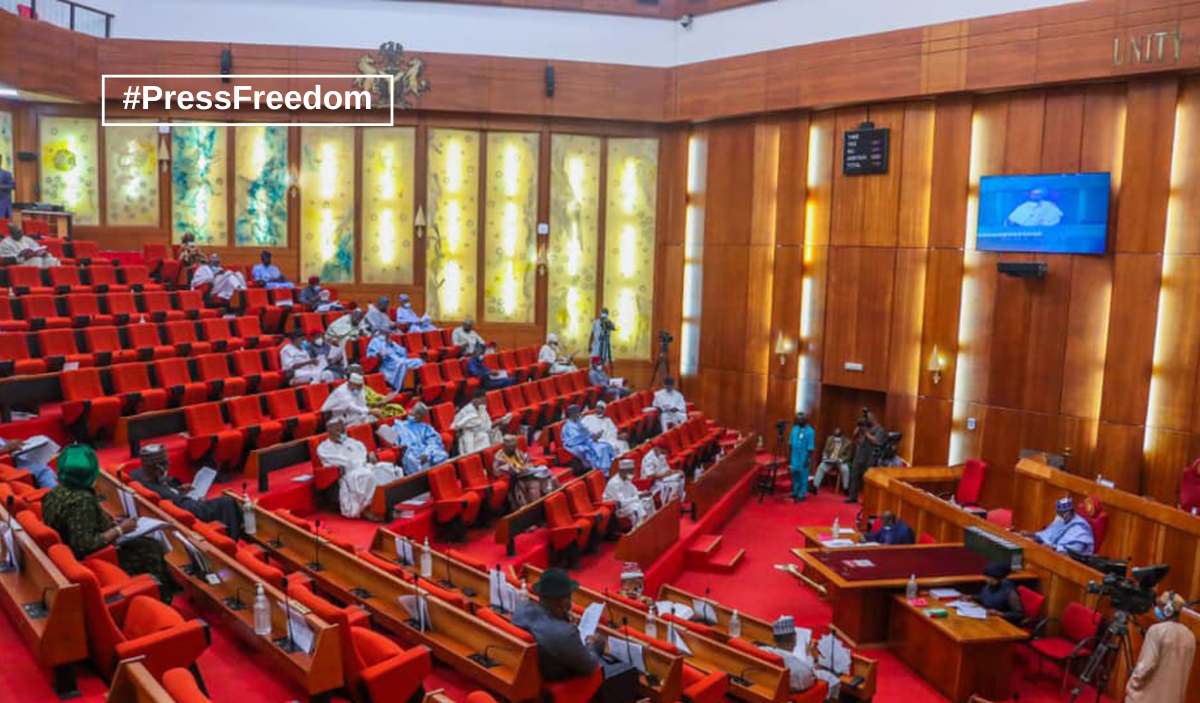
#PressFreedom: NASS Bars Press Coverage in Senate Proceedings

Nigeria’s senate president, Godswill Akpabio, has barred over 10 TV stations and photojournalists from covering senate proceedings.
This was disclosed following the resumption of senators on Tuesday. The journalists attempted to access the building, but armed operatives restricted them.
According to DailyPost, “One of the security operatives at the entrance of the chamber told journalists Akpabio instructed the security unit to restrict and prune down the number of media houses covering senate proceedings”.
A document signed by Senate Clerk Chinedu Akubueze and pasted at the chamber’s entrance listed only seven media houses that would now cover proceedings.
The media outlets banned include Galaxy TV, Ben TV, MITV, ITV Abuja, PromptNews, ONTV, and Liberty, except for The Nation Newspaper and Television Continental (TVC), owned by the President, Bola Tinubu.
While the unlawful ban calls for media attention, the leadership of NASS Press Corps met with Akubueze on Wednesday last week to harmonise issues about the coverage of senate proceedings.
Amidst the evidential gag on press freedom are reports of arrests of journalists, many of whom were simply doing their jobs.
On March 15, 2024, West Africa Weekly reported the arrest of First News Editor Segun Olatunji, who was abducted in his residence in Lagos over a publication of corrupt practices in the Office of the Chief of Staff to the President, Femi Gbajabiamila. The journalist spent two weeks in unlawful detention before his release.
Also, FIJ reported the abduction of its journalist, Daniel Ojukwu, on May 1, 2024, over a publication of corrupt practices in the Office of the Senior Special Assistant to the President on SDGs (OSSAP-SDGs), headed by Adejoke Orelope-Adefulire.
Ojukwu has spent seven days in unlawful detention without access to his lawyer, employer, or relatives.
Essentially, the crackdown on free speech emanates from public criticism, demand for good governance, and accountability, amongst other things.
About The Author
Mayowa Durosinmi
author
M. Durosinmi is a West Africa Weekly investigative reporter covering Politics, Human Rights, Health, and Security in West Africa and the Sahel Region
Mayowa Durosinmi
M. Durosinmi is a West Africa Weekly investigative reporter covering Politics, Human Rights, Health, and Security in West Africa and the Sahel Region
Related Articles
Tinubu Government Delays Release of Signed Tax Acts to the Public
Four days after President Bola Tinubu announced the signing of four tax...
ByMayowa DurosinmiJune 30, 2025As Tinubu Urges Africa-Caribbean Unity in Saint Lucia, Over 272 Nigerians Killed in June Alone
While Nigerians deal with deadly violence, worsening hunger, and mass flooding, President...
ByWest Africa WeeklyJune 30, 2025You Can’t Tax a Dead Economy: Nigeria Is Suffocating Under Its Own Policies
As Nigeria’s Central Bank clings to its benchmark interest rate of 27.5...
ByWest Africa WeeklyJune 30, 2025“Wike is Not a Blessing to Us, He’s a Disaster” — Workers Protest in Nigeria’s Capital Over Unpaid Wages, Poor Working Conditions
Staff members of the Federal Capital Territory Administration (FCTA) in Abuja barricaded...
ByOluwasegun SanusiJune 30, 2025











